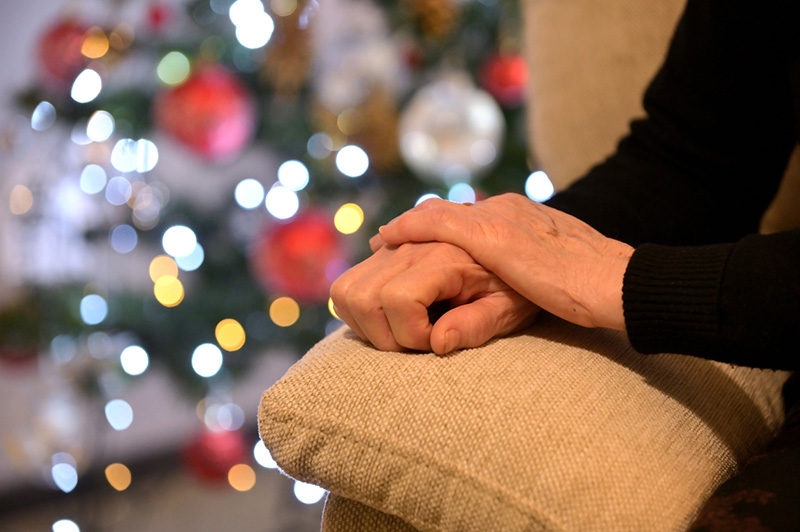The holiday season is often portrayed as a time of joy, togetherness, and celebration. Yet for many, it can be a time of complex emotions, especially for those coping with grief and loss. While grief is commonly associated with the death of a loved one, it’s important to recognize that it can stem from many forms of loss—not all of which are tied to someone’s passing.
Cancer survivors, for example, may grieve the loss of the life they once had, their physical abilities, or the health they used to enjoy. Families affected by a cancer diagnosis may mourn the way life used to be before illness became a central part of their story. This type of grief, often referred to as “ambiguous loss,” can feel particularly isolating, as it doesn’t always garner the same acknowledgment as bereavement.
If you’re navigating grief—whether tied to a loved one’s absence or life’s unexpected changes—know that your feelings are valid. Here are strategies to help you cope, honor your emotions, and find moments of peace during the holiday season.
Grieving More Than Death: Understanding Non-Physical Loss
Grief is not always tied to death. A cancer diagnosis can bring profound changes, both physical and emotional, leading to feelings of loss. Survivors may grieve aspects of their identity or abilities they once took for granted:
- The energy to participate fully in family traditions.
- Physical independence or mobility.
- Career ambitions or long-term goals that now feel out of reach.
- A sense of certainty or security about the future.
This grief can be hard to articulate, and those experiencing it may feel reluctant to express their sadness for fear of appearing ungrateful or pessimistic. However, it’s important to understand that grief and gratitude can coexist. You can mourn what you’ve lost while still cherishing what remains. Acknowledging this duality is a crucial step toward healing.
Honoring Non-Traditional Grief
If you’re grieving intangible losses, consider ways to acknowledge and honor these feelings:
- Name Your Losses: Write down what you’re grieving. Seeing these on paper can help validate your emotions and provide clarity about what you’re experiencing.
- Create a Ritual: Just as we light candles or share stories to honor those who have passed, consider a ritual for what you’ve lost. You might write a letter to your former self or create a scrapbook of memories from the life you’re grieving.
- Reframe the Narrative: While loss is undeniable, it can sometimes bring growth or new perspectives. For example, a cancer survivor might discover a deeper appreciation for life’s small joys or a newfound sense of purpose in helping others. Reflecting on these shifts doesn’t erase the grief but can help create a sense of balance.
Whether you’re grieving the loss of a loved one or the life you once knew, your emotions are valid. Grief is deeply personal and doesn’t need to meet anyone else’s definition to deserve recognition. By acknowledging your grief, you allow yourself the space to heal.
If you’re comfortable, share your feelings with trusted friends or family. This can help foster understanding and create a supportive environment during the holidays.
Adjusting to a New Normal
The holidays may look different when you’re grieving intangible losses, and that’s okay. It’s important to recognize that you don’t need to “fix” the holidays to make them feel like they once did. Instead, focus on adapting to your current reality:
- Simplify Expectations: If your energy levels or physical abilities have changed, adjust your holiday plans accordingly. For example, if you’re unable to host a large gathering, consider a smaller, more intimate get-together or participate virtually.
- Find Joy in Small Moments: Grief often narrows our focus to what we’ve lost. Actively seek out small moments of comfort or happiness—a warm hug, a favorite holiday movie, or a short walk in the crisp winter air.
- Be Open to New Traditions: Sometimes, creating new traditions can help bridge the gap between the past and present. This could be as simple as starting a gratitude journal or finding a new holiday activity that aligns with your current capabilities.
Lean on Support
Whether your grief stems from a loved one’s absence or changes in your health, leaning on a support system can make a difference. Connecting with others who understand your experience—whether through support groups, online forums, or therapy—can provide comfort and a sense of solidarity.
If you’re struggling with non-death-related grief, it may help to speak with a professional counselor who specializes in life transitions or chronic illness. They can offer tools and strategies to help you process these complex emotions.
Moving Forward with Grace
Grief—whether tied to the loss of a loved one, your health, or the life you once knew—is a journey without a fixed timeline. The holidays may magnify your emotions, but they also provide an opportunity to honor your feelings, celebrate your resilience, and create space for healing.
As you navigate this season, remember to be gentle with yourself. Take each day as it comes, surround yourself with support, and allow yourself to grieve in the way that feels right for you. Grief is a testament to love, and even amidst loss, there is room for hope, connection, and new beginnings.
For more information on dealing with grief during the holidays, visit CancerCare, American Cancer Society, or Hospice Foundation of America.



